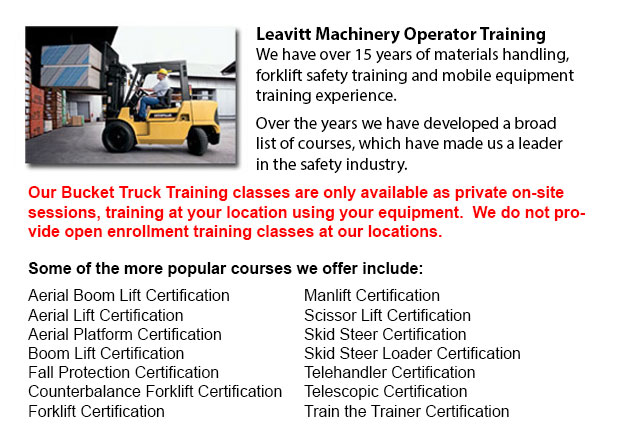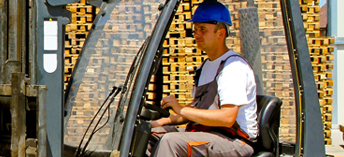
Ontario Bucket Truck Training - The bucket truck training program is a program that is designed to efficiently train operators who are qualified so they can decrease the risk of incident and personal injury when working with or in close proximity to bucket trucks or also referred to as vehicle-mounted aerial work platform. An aerial lift device refers to any vehicle-mounted device, articulating or telescoping, or both, which is utilized to position personnel to reach locations which will otherwise be unreachable. Aerial lift devices are used in order to elevate personnel to above-ground work sites.
The objective of the program is to provide operators with the skills, knowledge, training materials and abilities needed in order to learn to operate vehicle-mounted aerial work platforms effectively and safely.
The program has two portions: a hands-on session and a classroom training session. To be able to become certified, participants must be successful in both parts. A wallet-size certificate and a full-size certificate will be issued upon completion of the program.
The types of lifts examined in the program comprise Aerial lift devices are usually constructed with wood, metal, reinforced plastic, fiberglass or other materials.
Definitions
Articulating boom platform: has at least 2 hinged boom parts.
Extensible boom platform: has either a telescopic boom or an extensible boom.
Platform: part of the aerial device which is designed to carry staff.
Mobile unit: a combination of aerial devices, like for instance its vehicle and related machine.
Employees who work with aerial devices have the responsibility of making sure that they are properly authorized and trained. Employees should make sure that individuals who are not authorized and trained do not make use of lift devices. Employees must make sure that they wear the correct protective equipment when working from the platform.
Course content includes operation of the vehicle-mounted aerial work platform, pre-shift inspection, safe operating practices, lifting capacity, use of emergency controls, and administering practical and theory tests. Operators will know legal requirements under the federal and local regulations.
-
Ontario Manlift Certification
Ontario Manlift Certification - The Elevated Platforms and Manlifts Certification course helps to provide the required training on the work practices, safe operating procedures, regulations and rules regarding the everyday activities for the operator... More -
Ontario Crane Training
Ontario Crane Training - Bridge cranes or overhead cranes are actually a type of industrial material handling crane making use of a line and hook mechanism that runs on a horizontal beam running along two widely separated rails. Various overhead cran... More -
Ontario Aerial Lift Train the Trainer
Ontario Aerial Lift Train the Trainer - The Aerial Lifts Train the Trainer Certification Program teaches trainers how to effectively train operators in safe industrial mobile machinery operation. Trainers are given in-depth instruction about aerial l... More -
Ontario Warehouse Forklift Training Classes
Ontario Warehouse Forklift Training Classes - The reason for warehouse training classes are to raise the awareness of common workplace dangers. The trainees will learn essential warehouse safety procedures. An emphasis is placed on paying attention t... More -
Ontario Forklift Training School
Ontario Forklift Training School - Forklift Training School - Industry and federal regulators have established the criteria for forklift safety training based on their current standards and regulations. Those wanting to operate a forklift must finish... More -
Skid Steer Loader Training in Ontario
The engine powered skid-steer loader consists of a rigid and small frame, equipped along with lift arms that could attach to lots of industrial tools and attachments to execute many labor saving jobs. Normally, skid-steer loaders are four-wheel drive... More -
Ontario Crane License
Ontario Crane License - Crane operators ought to be "credentialed", that means they ought to own a crane operator certification or license. Credentialing is considered a mandatory governmental requirement to be able to practice as an operator of a cr... More -
Ontario Forklift Operator Training
Ontario Forklift Operator Training - Forklift training is a prerequisite in North America and is intended to prevent workplace injuries and death. Forklift training offers driver training intended for forklift operators. Training programs teach the s... More

Forklift Certification Ontario
TOLL FREE: 1-888-254-6157
Toronto, Ontario
forkliftcertificationontario.com
Email Us
About Us


